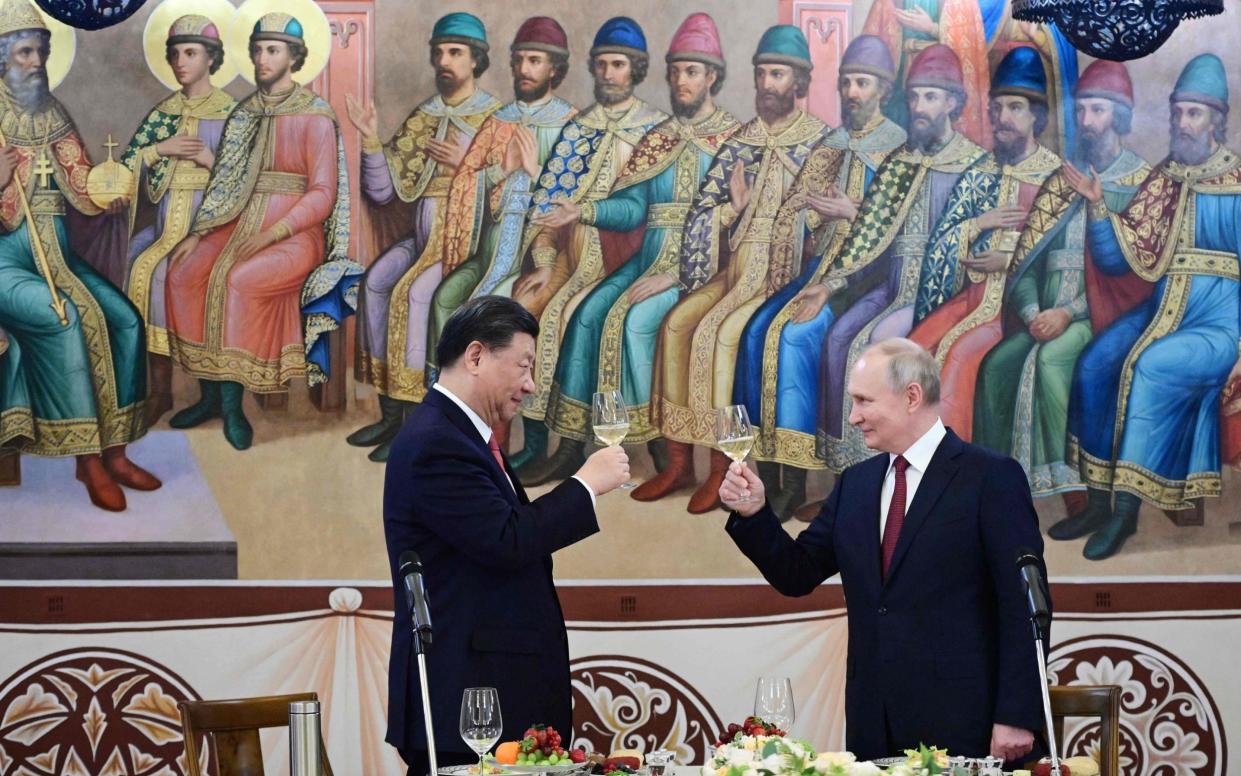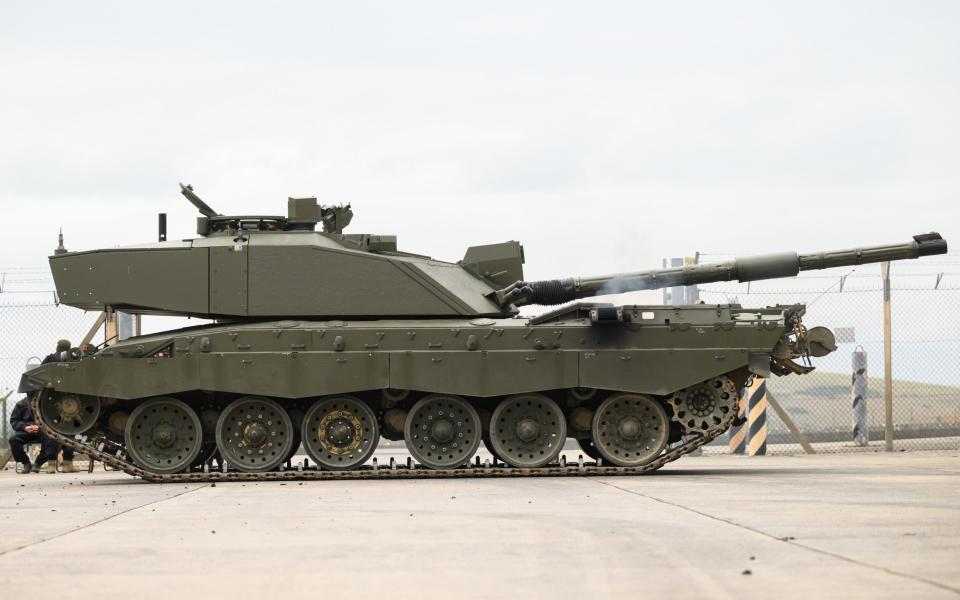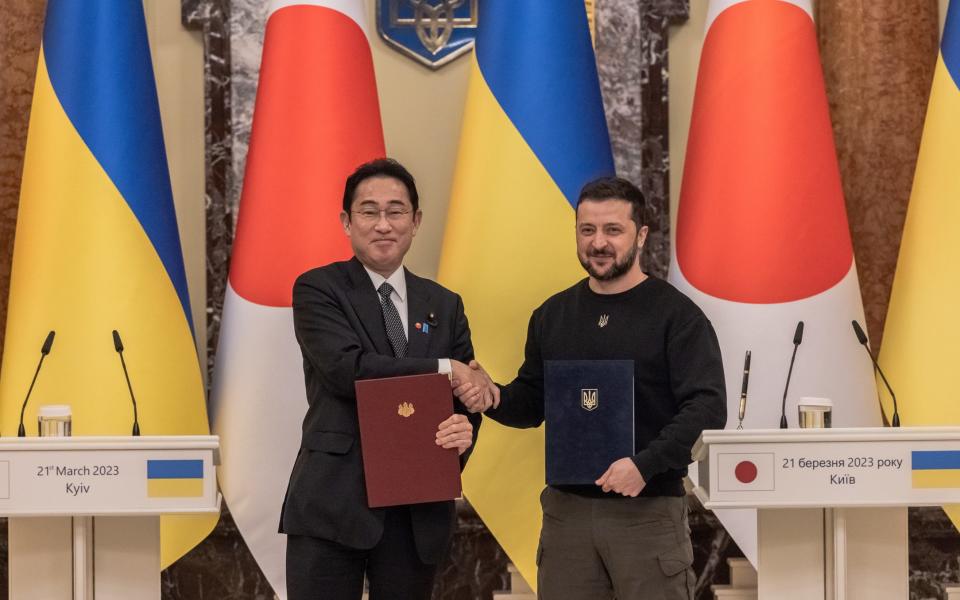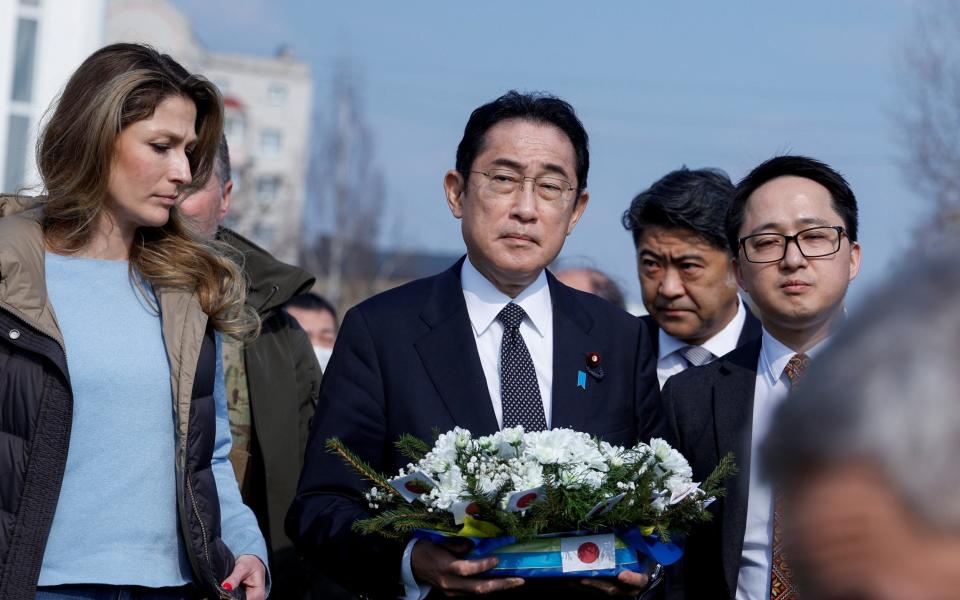Putin warns UK it is ramping up war with its 'nuclear component' arms for Ukraine

Vladimir Putin has accused Britain of escalating the war in Ukraine after it emerged that the UK will send Kyiv depleted uranium shells.
The Russian president was speaking at a joint press conference with Xi Jinping, the Chinese leader, where he said the delivery of the armour-piercing shells showed the West was not ready for peace.
The pair held hours of private discussions on China’s proposal for a ceasefire but little concrete emerged from the talks.
In the Kremlin press conference, Putin said he had been informed of Britain’s plan to send depleted uranium shells while holding discussions with Mr Xi.
“I would like to say: if this is happening, then Russia will have to respond properly since the collective West will be using weapons with a nuclear component,” he said.

On Monday, Baroness Goldie, the British defence minister, confirmed that the country would send depleted uranium shells to go with the 14 Challenger II tanks it is delivering to Kyiv.
“Such rounds are highly effective in defeating modern tanks and armoured vehicles,” she said.
Sergei Shoigu, Russia’s defence minister, said after Putin’s remarks that there were “fewer and fewer” steps left before a nuclear war with the West.
The heaviness of depleted uranium means the shells can easily pierce tank armour. But inhaling fragments left at impact sites can be hazardous to human health, according to the US Department of Veterans Affairs.
Hamish de Bretton-Gordon, a former commander of the Royal Tank Regiment and weapons expert, said it was “bonkers” for Russia to claim the weapons were equivalent to nuclear arms.
“Depleted uranium is completely inert,” he said. “There is no way that you could create a nuclear reaction or a nuclear explosion with depleted uranium.”
The shells are not covered by any international arms treaty nor is there any ban on their use.
Mr de Bretton-Gordon said Russian tanks were probably using depleted uranium shells themselves.
The second day of Mr Xi’s visit to Moscow featured a lavish ceremony in the Kremlin, with the leaders shown on state television striding towards each other for a handshake from opposite ends of its marble-panelled hall. Later they clinked glasses of white wine at a dinner in the 15th Century Faceted Chamber, a ceremonial throne room.
Yuri Ushakov, Putin’s typically unemotional foreign policy adviser, was overjoyed by the scenes. “Two great nations, two neighbours are solving the most pressing issues of global politics and bilateral relations: Our adversaries are probably nervous, and it’s only natural,” he told reporters on the sidelines of the talks. However, Mr Xi will have disappointed those who hoped he would offer firmer backing for Moscow’s war.
On Tuesday, he reiterated China’s position was to seek peace in Ukraine on the principles of the UN Charter, celebrating closer ties with Russia but not committing to any further military or diplomatic support.
Putin said he had spent a long time discussing China’s peace plan and that many elements in it were aligned with Russia’s views. However, he said Kyiv and the West were not ready for negotiations.
China has released a vague 12-point plan calling for a ceasefire but both the US and Britain have dismissed any pause in hostilities on the current front lines as essentially “endorsing” Russian conquest.
Volodymyr Zelensky, Ukraine’s president, said he had invited China for peace talks but was still waiting for an answer.
”We offered China to become a partner in the implementation of the peace formula,” he told a press conference. “We passed over our formula across all channels. We invite you to dialogue. We are waiting for your answer.”

Ukraine passed a law last year that bars the government from negotiating with Putin personally, and Kyiv has repeatedly said it will not negotiate until Russian troops leave its territory.
While Putin spoke of progress in negotiations on the construction of a second Russian gas pipeline bound for China, Mr Xi’s closing remarks were vague and devoid of any concrete proposals or announcements.
The two leaders oversaw the signing of over a dozen of documents but most appeared to be non-binding memoranda of cooperation. In a joint statement, the two leaders said they were committed to avoiding nuclear war.
Meanwhile, Fumio Kishida, the Japanese prime minister, on Tuesday made a surprise visit to Kyiv, symbolically highlighting his country’s growing tensions with China.

Before meeting Mr Zelensky, Mr Kishida visited the suburb of Bucha which has become a byword for Russian atrocities in the war.
Japan, which enjoyed close ties with Russia before the invasion, has joined Western sanctions against Moscow but Mr Kishida was the only leader of the Group of Seven nations who had not visited Kyiv yet.
Last week's ruling by the International Criminal Court, seeking the arrest of Putin, is likely to push the Russian leader closer to China, experts said.
“If anything, the International Criminal Court’s arrest warrant for Putin only increases China’s leverage on Russia,” Alexander Gabuev, a senior fellow at the Carnegie Endowment for Peace, tweeted on Tuesday.
“Xi Jinping can’t be embarrassed by meeting Putin, and the verdict only puts Xi’s ‘dear friend’ into the Kremlin deeper in his pocket.”

 Yahoo News
Yahoo News 
